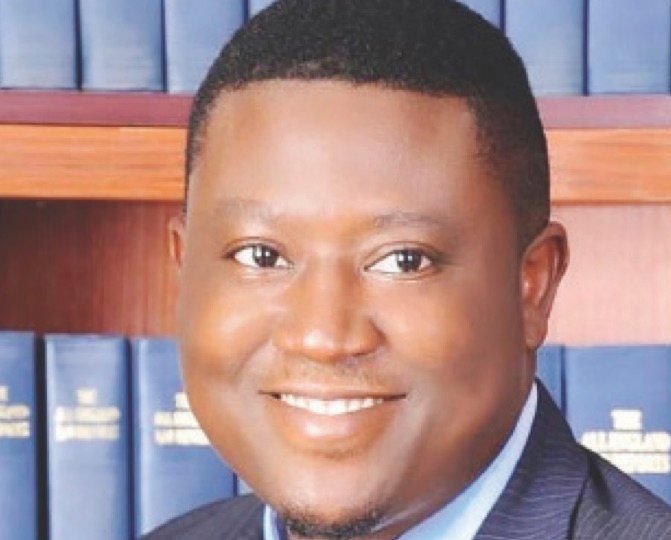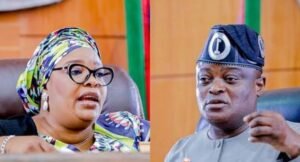…Says it violated Section 308 of constitution
By Daniel Kanu
Osigwe Ahmed Momoh, constitutional lawyer and activist, in this encounter speaks on presidential power and legal limitations with regard to the state of emergency declaration in Rivers State.
He throws light on how President Bola Tinubu has violated the right of Governor Siminalayi Fubara who enjoys immunity by virtue of Section 308 of the constitution.
Momoh raised more contending issues, submitting that Tinubu is abusing the constitution .Excerpt:
Some analysts have opined that President Bola Tinubu’s State of Emergency proclamation is constitutionally an aberration, as well as his subsequent suspension of the elected officials, saying this constitutes a clear overreach of his executive powers. Neither Section 305 nor Section 11 of the Constitution grant the President the authority to take those actions. Would you like to expand a little bit more on those sections, 305 in the Consti-tution, as a basis of clarification for the actions he took and whether or not they are constitutional?
Absolutely. I think that the point we need to get when we drive at Section 305 is the introductory phrase. Now, there are two words or phrases that are very common in the 1999 Constitution and probably in every enactment we have. Notwithstanding, on one hand, and subject to. So the moment you come across the phrase, “subject to”, you understand that particular enactment is limiting, is restrictive, and it must be read in line with every other provision of the Constitution. Notwithstanding, on the other hand, we give the President the power, or any interpreter for that matter, to say, okay, this particular section empowers me. But Section 305 is clear. It is subject to every other provision and there are clear means where a governor or a president can leave office. We have about four, or probably five. The fifth would be maybe he’s traveling and he grants power to his deputy for acting. But typically, we know that if he resigns, he can leave, in line with the Constitution. We also know that if he’s impeached, he can leave. Unfortunately, if there’s death, he can leave. And if he becomes, non-composementist or lacks the mental and physical ability to lead, he can leave. These are the only ways. The shocking thing about what Mr. President seemed to have done is that he seemed to have forgotten the rest of the sections of 305. Subsection 4 seemingly allows the governor of a state to be the person, the actual person, to reach out to the presidency and say, I need a state of emergency in my state. Now, are we saying, for example, the governor of Rivers State had reached out to the president to say, I need a state of emergency. Is there a possibility that he would have been suspended? Absolutely not. So the mere fact that the president has gone to suspend him because of this state of emergency, it means that he didn’t read the entire or the advice he’s getting is to neglect some very salient part of Section 305. A good example of that would be Sub-section 5. Now, why I like Sub-section 5 is because of a phrase that was introduced there, at a reasonable time. If the governor or until and unless the governor fails to reach out to the president within a reasonable time, that is only when the president can be deemed or said to have now, you know, proclaimed a state of emergency. Are we seeing the actions that happen, which we probably believe to be the bomb blast or the pipe bomb explosion. Was that reasonable time to have made Mr. President say, hey, I’m going ahead with this decision? Absolutely not. If we fail the sniff test. And what we are driving at now is Section 308. Section 308 gives a governor immunity. Now that he has been seemingly suspended, can anybody at all argue that the governor doesn’t have the immunity power right now? If he says, I’m not leaving the Government House, could he have been forced out? Can any judgment push him out? The answer to that would be no. So because he enjoys it, he cannot be kicked out of office. The immunity is there. And I think anybody trying to read left, right, and centre and painfully, I saw this morning that, you know, the new chief of staff is a lawyer, a distinguished lawyer for that matter. I wish, you know, it’s our responsibility as lawyers, whether in practice or not, to defend the constitution.
This is scary. President Tinubu may mean well for Rivers State. I’m not saying he does.
He may mean well. But what happens in 2030? Or in another 50 years? What happens with these precedents that can make a president basically be the school-master of a governor? Then we are driving to a one-party state. We have a situation whereby, you know, a governor can be there and he knows if he doesn’t align with the president, he can be kicked out. Everybody can create one sort of reason or another why there should be, you know, a state of emergency. And with a state, there are only three grounds. If the reason or the cause for this state of emergency is localized to a state, it has to be because of the fear of breakdown of law and order or an actual breakdown of law and order.
And if you look at this, is it fair to say that there’s such a breakdown of law and order in the state? In any case, the governor of the state is not in charge of the police. We know this. He’s not in charge of the military. He’s not in charge of any security agency. I don’t think that it is fair for the president to suspend him. The state of emergency ought to be in line with what the former president, GoodLuck Ebele Jonathan did. Where we have a president or a governor who continues governing and the security apparatus of the state completely is now nested with the presidency. And the idea of a sole administrator is shocking. It’s a very terrible precedent. Down the line, I fear it can be abused even further. This is a bad precedent, and I think nobody should stomach it. And more so, there is also a constitutional provision that says you need two third majority of both houses, not voice vote. So why are we buying this rubbish? Why are we playing the ostrich? Why are we pretending as though Fubara has been legitimately suspended? He cannot be suspended. Mr. President is definitely doing the impossible. And we can laugh at it. We can smile at it. Lawyers can argue left, right, and centre. But the reality is that this is a terrible precedent if we want to swallow its hook, line, and sinker. And I don’t think Nigeria should stand for this. I think it’s scary. I think we should advise Mr. President. He has the best lawyers around him. Aside from the Attorney General of the Federation, who is probably one of the smartest lawyers in Nigeria right now, he has Mr. Keyamo by his side. He can act and forget the politics. Let us break down this law. Does this make sense? Would this be a terrible precedence down the line? The president cannot just be telling all these horrible issues. He must think of a way to move on in Nigeria.
Now, you talked about the president being surrounded by some brilliant minds, some brilliant legal minds. How then do you explain the fact that the AGF actually is in support of what the president has done in Rivers State? He said that it’s constitutional. How do you explain that? Now, SERAP, Socio-Economic Rights and Accountability Project, a non-governmental organisation, announced it will legally challenge the president’s declaration of state of emergence in Rivers State. How do you think this will play out in the courts?
I think for SERAP, it’s likely to fail because of jurisdiction and they’re going to say you lack locus standi to come and bring this matter to court. The proper party ought to be Attorney General of Rivers State who is still the Attorney General of River State despite the shenanigans of the Attorney General of Federal Republic of Nigeria. This was the precedence we had in Plateau State where the Supreme Court queried the parties who brought in this matter before the court. In that case, it was the state of Plateau instead of the Attorney General. So the Attorney General of Rivers ought to be the proper party to bring this matter in line with Section 232 and insist that this is a matter that should be domesticated at the Supreme Court at first instance. This is the line they should go. And for the Attorney General, of course, I hope he remembers, I mean, I don’t want to speak so harshly about him. This is somebody I personally admire that I’ve admired for a very long time.
I know he knows better. In my heart, I know he knows better. And I hope that these people blind their eyes to politics, realize that you are a lawyer first, the law matters to you, and that’s what matters.
President Bola Ahmed Tinubu once fought against and complained against the same thing he’s doing. Are we supposed to pretend that there is no political amnesia? How come it was intolerable when President Obasanjo did it? And Goodluck Jonathan did it. And all of a sudden, you find that it’s necessary for you to do the same thing! It’s offensive to common sense. You once fought this, and now you’re pushing this. You have not even explained to us why you thought it was terrible in the past and you now think it is okay in the present. I think it’s difficult to digest, if you ask me.
There are a couple of governors from Bauchi, Adamawa, Bayelsa, Enugu, Osun, Plateau and Zam-
fara states. They’re heading for the Supreme Court over this matter, over Rivers State having a state of emergency as declared. Does any of them have the locus standi in this issue, seeing as how they’re not directly impacted by the issues of River State? What do you make of this?
I think the court will also want to say that it’s basically or clearly academic and the court is clear in its position that it doesn’t give room to academic questions or hypothetical questions. And until and unless there’s a real issue before the court, before it can decide. Now, they have a right to say that they are governors. If the governors forum, for example, I think that gives more credence. And if it’s a political party also, I mean, the governors are coming from the political party, it will fail. The point is that it doesn’t go to the Supreme Court originally, doesn’t mean it cannot go to the Federal High Court, which is the proper place to probably start this kind of matter, because there are several issues to be discussed. But the time factor between the Federal High Court that would probably travel to the Supreme Court is why when we have issues that have to do with the state and the Federal Government, then the Supreme Court immediately comes in and assumes original jurisdiction. So I fear that the court will probably think that this is hypothetical, it’s academic, you know, it’s something that the court doesn’t give credence to.
So how does the emergency rule declaration impact the system of checks and balances between the executive, the legislative and judiciary branches of government in Nigeria?
I mean, clearly the way this particular step was done, so the constitution was very, made it extremely complex. The two-third majority is a very stringent condition, and in both houses, made it even more stringent. The idea was to make sure that nobody can whimsically throw his magic wand and say, I don’t like your face, or I don’t like the situation in your state, I’ll sack you. The president is not necessarily the principal, and the governor is a student. At best, it will be a situation of class rep and course mates. So they are co-equals in this state called the Federal Republic of Nigeria. And so Mr. President cannot do this without the necessary check two/third majority. A voice vote fails, and if the constitution stipulates a specific thing or mode where a thing ought to be done, if it’s not done in line with that constitutional provision or statutory provision, that action is not done. So it is fair to say Mr. Fubara is not suspended, because he wasn’t suspended in line with the constitution in the first place. You know, there are several questions that ought to be asked, and we must ask this question boldly, and I expect the bench to be very interested in this, and the bar to be more animated in this, because we need to protect our constitution, not just because of what is happening in Rivers State.
I believe an impeachment would have been a proper route, and I understand the need to assume security, but let’s not play pretend. Let’s be honest, the president is in charge of the security of every state in Nigeria, because he can assume the role of sacking the commissioner of police instantly. That’s not left to the governor. We don’t have state police in this country. All the security agencies are domiciled by the Federal Government. So the only reason for a state of emergency is for security.
There’s no other reason to declare a state of emergency. It’s solely for security, and the security apparatus of the state can be in charge of the Federal Government, while the continuous government remains and is domesticated with the governor. At best, there should be the situation where President Jonathan did it the last time, which was in Borno State and a couple of other states.That ought to be the model, whereby we have the governor, Fubara, still the governor, and then we know that as far as security is concerned, there is a special heightened security presence in the town. If the president meant it, that’s what would have happened. What has happened right now is very offensive to democracy.
It’s offensive to common sense. I don’t think anyone should stomach it. I understand if you want to look aside for political reasons whatsoever, but I think ultimately the Federal Republic of Nigeria is bigger than your political interests, and this should be a clarion call for everybody in the bar.
I’d like you to expand a little bit further, how does Section 308, which provides immunity to certain public officers, impact the proclamation of a state of emergency in Rivers State, particularly with regards to the governor, his deputy, who have all been suspended?
Absolutely, and that is a brilliant question, and this is a question that is seemingly missing in this debate right now. The question is simple.
Now that you have suspended the governor, have you fettered the power invested in the governor by Section 308? Basically, that’s what you are claiming to have done. Are you saying if the governor refused to leave the office, you could have forced him out, you could have arrested him, you could have brought an order of court against him? Absolutely you cannot. A governor has the right to do and undo until and unless he’s removed in line with the constitution, and suspension is not one of it.
So the point of the matter is that he enjoys 308 to date. Therefore, since he has an immunity, since he cannot be arrested, since he has the unfettered power to continue being in power, I mean to have his power continuously exercised by himself without fear of arrest, or imprisonment, or any other force whatsoever. He cannot be forced out, he cannot be pushed out.
No policeman can go and valiantly drag a sitting governor, leave this Government House. And I don’t know how he was whisked away. You know, so the point of the matter is that Section 308 protects the office of the governor. Now, we have a situation whereby the president has fettered it indirectly, and the question is if you suspend the governor, are you saying you can fetter Section 308? This is the question I’d like the Attorney General of the Federation to answer, along with the other five lawyers we have around Mr. President. Please explain to us what has happened to the governor’s Section 308, his right to Section 308? Have you fettered his immunity? Does he still have immunity? Can you arrest him? Can you push him out? Can you imprison him? If he decides to say as the governor, I’m going back now to Port Harcourt today to assume my duty, what would you do? I’d like to know. I think there’s a backdoor approach to this matter that is quite offensive, and we must ask this question. Does the governor still have 308? I don’t know. As I’m sitting right now, I don’t know if he still has 308. It seems to me that he doesn’t, and I want to know how the president can fetter Section 308. What part of the constitution gives you the right to fetter the right of an existing governor’s deputy or even vice? You can’t even do that to the vice president. So how do you now want to do it to a governor? It doesn’t fly.







